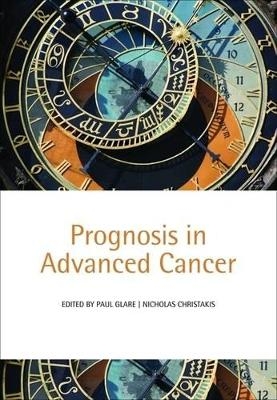
Prognosis in Advanced Cancer
Oxford University Press (Verlag)
978-0-19-853022-0 (ISBN)
Predicting survival and other outcomes is increasingly being recognized as an important skill for palliative care doctors and nurses, oncologists, and other healthcare professionals who treat patients with advanced cancer. Accurate prognosis is essential if we are to offer quality of care and 'a good death', as well as to aid decision-making. There is much prognostic information available that is scattered throughout the palliative care and oncological literature but this is the first time it has been gathered systematically in one place.
Glare and Christakis, leaders in the field of prognosis, bring together a team of international contributors from across the fields of palliative care and oncology. This comprehensive but practical guide begins with the principles of prognostication, including formulating the prediction and then communicating it. Topics such as statistical issues, evidence-based medicine, and the ethics of prognostication are also covered. The second section addresses prognostication in 15 specific cancer sites once they have reached the advanced stage, following a standard template for consistency and easy access to the key information. The third section deals with prognostication in patients with a variety of common clinical conditions at the end of life, such as bowel obstruction, hypercalcaemia, and brain metastases. In addition, survival curves are provided within each chapter, palliative care conditions are examined for the first time, and a summary table of long and short term prognosis ensures this book remains practical.
Dr Paul Glare has been a Fellow of the Royal Australian College of Physicians since 1990, a Fellow of the Chapter of Palliative Medicine since it was created in 2000 and is a Fellow of the Faculty of Pain Medicine. As well as maintaining a full clinical load, he is an active teacher and researcher. His principal research interests are prognostication and the anorexia cachexia syndrome. He was the inaugural Research Fellow in the Palliative Care Program at the Cleveland Clinic Foundation, Ohio USA, from 1989 until 1991. For more than 15 years he has taken a leadership role in the development of the specialty of palliative medicine, both locally and internationally, and is currently managing major initiatives in palliative care education and service delivery for the New South Wales Department of Health. Nicholas Christakis is an internist and social scientist who conducts research on social factors that affect health, health care, and longevity. His clinical work is in the field of palliative medicine. Dr. Christakis's past research has examined the accuracy and role of prognosis in medicine, ways of improving end of life care, and the determinants and outcomes of hospice use. He is currently concerned with health and social networks, and specifically with how ill health disability, health behaviour, health care, and death in one person can influence the same phenomena in others in a person's social network, including issues related to caregiver burden. Dr. Christakis was the recipient of the Distinguished Researcher Award, National Hospice and Palliative Care Organization, awarded for an "outstanding body of work contributing to the enhancement of hospice and palliative care" in 2006.
PART 1: SCIENCE OF PROGNOSTICATION ; 1. Overview: advancing the clinical science of prognostication ; 2. Differences in prognostication between early stage cancer and advanced cancer ; 3. Foreseeing: formulating an accurate prognosis ; 4. Foretelling: communicating the prognosis ; 5. Statistical concepts and issues related to prognostic models ; 6. Evidence based medicine ; 7. Tools for formulating prognosis ; 8. Ethics ; PART 2: PROGNOSTICATION IN SPECIFIC CANCERS ; 9. Lung cancer ; 10. Colorectal cancer ; 11. Breast cancer ; 12. Bladder cancer ; 13. Prognosis of prostate cancer ; 14. Pancreatic cancer ; 15. Hepatoma ; 16. Head and neck cancer ; 17. Gynaecological cancer ; 18. Brain cancer ; 19. Non-Hodgkin's Lymphoma (NHL) ; 20. Leukaemia and myeloma ; 21. Sarcoma ; 22. Unknown primary ; 23. Melanoma ; PART 3: PROGNOSIS IN PALLIATIVE CARE ; 24. Bone secondaries ; 25. Brain secondaries ; 26. Leptomeningeal disease ; 27. Liver metastases ; 28. Lung secondaries ; 29. Hypercalcemia ; 30. Spinal cord compression ; 31. Pain relief ; 32. Malignant bowel obstruction ; 33. Breathlessness ; 34. Delirium ; 35. Weight loss ; 36. Fatigue
| Zusatzinfo | 47 black and white line illustrations and 14 black and white photographs |
|---|---|
| Verlagsort | Oxford |
| Sprache | englisch |
| Maße | 171 x 246 mm |
| Gewicht | 738 g |
| Themenwelt | Medizin / Pharmazie ► Medizinische Fachgebiete ► Onkologie |
| Medizin / Pharmazie ► Medizinische Fachgebiete ► Palliativmedizin | |
| Medizin / Pharmazie ► Pflege ► Palliativpflege / Sterbebegleitung | |
| ISBN-10 | 0-19-853022-6 / 0198530226 |
| ISBN-13 | 978-0-19-853022-0 / 9780198530220 |
| Zustand | Neuware |
| Haben Sie eine Frage zum Produkt? |
aus dem Bereich


